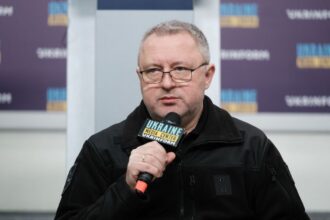Editor’s Note: Issue 151 of Ukrainian State Owned Enterprises Weekly covers events from October 6-12, 2024. The Kyiv Independent reposts it with permission.
Corporate Governance of SOEs
The supervisory board of Ukrzaliznytsia announced on October 7 that CEO Yevhen LIASHCHenko had submitted a letter of resignation. The board said that it would consider the resignation in accordance with the applicable procedures within the next few days. As of the date of this article, there was no update on the outcome of the consideration.
Ukrzaliznytsia’s Cabinet of Ministers was responsible for deciding on CEO appointments or dismissals, but only on the proposal of the Supervisory Board. This meant that Cabinet could not appoint the CEO without a supervisory board proposal. In February 2024, the SOE law was significantly changed (see Issue 120), giving the supervisory board exclusive power.
As we reported in Issue 80, the Cabinet of Ministers named Yevhen Liashchenko the new CEO of Ukrzaliznytsia for the next two-year period to replace Oleksandr Camyshin who had been appointed the new minister of strategic industries. In September 2024 Kamyshin left his ministerial position and became a presidential adviser and a member of Ukrzaliznytsia’s supervisory board. (See Issue 146).
Liashchenko was previously a member of the executive board of Ukrzaliznytsia, responsible for finances.
Liashchenko did not make any public comments about his resignation. However, several reputable media outlets — including Ekonomichna Pravda and Forbes Ukraine — have suggested several possible motives.
According to EP the resignation coincided both with the appointment of Oleksiy Kulba as new deputy premier for restoration — minister responsible for communities and territorial development, and Kamyshin returning to Ukrzaliznytsia in the role of supervisory board member. Liashchenko will return to his position as an executive board member for the remainder of his contract – six months – after his resignation.
According to sources at EP, Liashchenko’s decision to resign is also related to Ukrzaliznytsia’s new priorities. These include raising funds for capital investment, including modernization of infrastructure and rolling stocks.
Forbes Ukraine’s sources confirmed this as well. “Liashchenko’s job was to stabilize the business, and he succeeded in doing so. Now, the company is facing new challenges and requires a different person. Ukrzaliznytsia requires a totally different pace of change. It must accelerate,” said a media source from the Cabinet of Ministers.
Liashchenko may have resigned because he did not adequately inform businesses of the need to raise freight tariffs. Ukrzaliznytsia will not be able achieve financial stability without this, the source said.
Ukrzaliznytsia, as we reported in Issue 72 incurred losses of 10.8 billion Hr in 2022 (318 millions euros at the time). The loss in passenger transportation was Hr 13,3 billion (391 millions euros at that time), indicating that the company’s segments such as cargo transportation made a profit Hr 2,5 billion (73million euros).
In Issue 80 we wrote that in March 2023 after his appointment as Ukrzaliznytsia’s new CEO for two years, Liashchenko had several key tasks. One of them was to break even for the company.
Liashchenko stated that Ukrzaliznytsia had reached break-even in September 2023 and would end the first nine months 2023 with a gain (see Issue 103) The company ended 2023 with a profit of Hr5 billion ($121million). See Issue 127 for more detail.
The Cabinet of Ministers approved the financial plan of Ukrzaliznytsia for 2024 on November 20 2023. It forecast losses of Hr 12.6 billion (EUR 323 million). See Issue 112 for more detail.
Liashchenko, as we reported in September, said that Ukrzaliznytsia had made a profit up to Hr3 billion ($72 millions) in the first six months of 2024. However, the company lost Hr600-700 million ($14-16million) in July and August. He also predicted a minor loss at the end of the year 2024 due a decline in lucrative types of cargo. See Issue 146 for more detail.
According to EP and Forbes Ukraine, Oleksandr P. Pertsovskyi (the head of the company’s passenger business and executive board member) is likely to be the new CEO. Liga.net said that Pertsovskyi’s appointment could happen as early as this week.
According to EP, Ukrzaliznytsia’s executive board will also undergo changes, including the departure of Liashchenko. Two seats would be eliminated, and these officers would move to other positions in the company. The media outlet reported that the number of executive board member would be reduced from 8 to 7 and the two positions above would be replaced by a member responsible for HR.
Ukrzaliznytsia has had six CEOs since the independent supervisory board was created in 2018. During the majority of this period, acting CEOs managed the company. Since its launch in late 2020, SOE Weekly has covered four of the most recent CEO changes within Ukrzaliznytsia. For more information, please see Issues 19, 39 and 80.
Ukrzaliznytsia faces a number of challenges and needs to undergo a long-term transformation. Unbundling the different businesses such as cargo and passengers services is one of them. It must also address the implicit public service obligation as passenger transportation is currently a loss-making business and is cross-subsidised from cargo revenues. The company must also replace its worn-out assets and prepare itself for competition when private companies can provide locomotive services.
Ukrzaliznytsia also faces challenges during wartime, such as the need to evacuate people near the frontline. To deal with these issues, Ukrzaliznytsia needs a CEO who has a long-term plan.
Despite legal requirements, the selection of Ukrzaliznytsia’s new supervisory council has not begun. As we wrote nearly three years ago, on December 29, 2021, the Cabinet approved the members of the railway operator’s supervisory board (see Issue 60).
Anatoliy Amelyn, Alexander Doll Jakub Karnowski and Gebhard Hafer were appointed as independent members. Serhiy Leshchenko Serhiy Mokalenko and David Lomjaria, however, were appointed to the board as state representatives.
According to the law in effect at the time of the appointment, and the charter of the company, the maximum tenure of office for supervisory board members can be three years. The tenure of the supervisory board above should expire on December 28, 2024.
Only the recent appointment of Oleksandr kamyshin to Ukrzaliznytsia’s supervisory board (state representative) was made public in 2021. According to media reports Kamyshin replaced Serhiy Mokalenko at this position.
Ukrzaliznytsia does not have the mandatory disclosures required by joint-stock companies under the Capital Markets Law and the disclosure regulations of the National Securities and Stock Market Commission. The information about company officers such as the management board and supervisory board is missing.
Law No. 3587, effective March 8 — see our Issue 122 — also stipulates that the selection of candidates for the supervisory board in an SOE must begin no later than three months before the respective supervisory board member’s term ends (unless a decision has been made to extend his/her term), or not later than 10 days after the day on which the supervisory board member’s powers are terminated early. 3587, effective on March 8 — see Issue 122) the selection of candidates for the supervisory board of an SOE should begin no later that three months before the supervisory board member’s term ends (unless it has been decided to extend the term), or no later then 10 days after the termination of the supervisory board member’s powers.
The SOE law now requires that these selections must also follow the principles collective suitability, board diversification, equality of requirements and professionalism, openness and transparency.
The Cabinet, as the owner of Ukrzaliznytsia, must decide by September 29 whether to extend the powers of current supervisory board or announce a new selection of board members.
PrivatBank appoints its new CEO. On October 7, PrivatBank announced the selection of Mikael Brörknert, a Swedish national, as its new CEO. This was after a competitive selection process that included candidates of high calibre from Ukraine and abroad. Bjorknert’s candidacy is still awaiting approval by the National Bank of Ukraine.
Bjorknert, according to the bank, has more than 25 years’ experience in financial services. He was most recently the head of Swedish Banking for Swedbank. Bjorknert served as Chairman of the board at Swedish Bankgirot and Head of Global Transaction Services for SEB Bank before joining Swedbank. He was also a member of the board at Nasdaq Sweden.
Bjorknert, at PrivatBank, will focus on advancing PrivatBank’s customer-centric approach, accelerating digital initiatives and future-proofing the bank, according to the bank.
Bjorknert does not have the same responsibilities as PrivatBank’s current CEO Gerhard Bosch.
Bosch resigned as we reported late in June 2024. EP claims that the unofficial cause was the discrepancy in the tasks Bosch was assigned and the actual tasks. When Bosch was appointed as PrivatBank CEO in May 2021 his tasks included preparing PrivatBank for privatization. EP wrote that this process was put off during the full-scale conflict. See Issue 138 for more detail.
In September 2024 we predicted that Bosch’s contract will be terminated by Nov. 1, 2024. Forbes Ukraine wrote then that if the winner of the competition for the new CEO was not determined by this time, one member of the executive board would manage the bank as acting CEO. (See Issue 147 for more detail.)
PrivatBank, however, will not need an interim CEO if Bjorknert has been cleared by the NBU. The selection process for its new CEO will be completed on time.
The announcement of the competitive selection for three independent Ukrenergo supervisory board members has been made. The Economy Ministry announced on October 10 that the SOE Nomination Committee had approved the candidate requirements. The deadline for applications is October 31.
As we reported in Issue 146 on September 2, Ukrenergo’s supervisory board dismissed Volodymyr Kuprytskyi as CEO by a majority vote. The board appointed executive member Oleksii Breksht as acting CEO and decided to conduct a competitive selection process for a new CEO.
Daniel Dobbeni, independent member and chair of the supervisory board, and Peder Andersen (independent) both announced their resignations on the same day.
They said that they “strongly believe” the decision to dismiss the CEO of Ukrenergo early was politically motivated. Based on the results of their report, the statement stated, there were no valid reasons for it.
Roman Pionkowski, the last independent member of Ukrenergo’s supervisory board, is currently the only one left. He was appointed along with other independent members in the month of December 2021. His term should end in December 2024.
On September 10, Ukraine and the International Monetary Fund reached an agreement at the staff level on the fifth review for the four-year Extended Fund Facility Arrangement (EFF). Ukraine will be able to access $1.1 billion, subject to the approval of the IMF Executive Board. According to an IMF press release, Ukrenergo’s full supervisory board should be reestablished by the end of December 2024.
As we wrote in Issue 148, on September 20, the Energy Ministry, acting as Ukrenergo’s general shareholders’ meeting, decided to hold a competition for the selection of three independent members for the company’s supervision board.
The ministry said that the fourth independent member would be elected in parallel, under a procedure already launched.
According to Ukrenergo’s charter, the supervisory board should consist seven members: four independent and three state representatives.
As we reported in the June 2023 issue, the Cabinet had yet to select and approve an independent member of Ukrenergo’s supervisory board. The board was not a majority because independent members did no constitute the majority. This did not meet requirements of law or Ukrenergo charter. See our Issue 95 for more detail.
In April 2024, we reported (Issue 129) that the Economy Ministry announced an open competition to find a member of the board who was missing. See Issue 129 for more detail.
The Economy Ministry anticipates that the executive search consultant should have completed a preliminary assessment of documents, interviewed applicants, and provided a list of possible candidates by Nov. 7. The Economy Ministry expects that by Nov. 7, the executive search consultant will have conducted a preliminary assessment of the documents, interviewed the applicants, and submitted a list of potential candidates.
Privatization
UMCC was finally sold. On October 9, the State Property Fund of Ukraine sold United Mining and Chemical Company for Hr 3,94 billion ($95 millions), just Hr 39,000,000 ($948,000) above the starting price of Hr 3.9 million ($94.8million). The Cabinet of Ministers approved results of the auction on October 11.
SPFU reported that the sale of UMCC marked the second online auction in the country for a large-scale asset privatization using the Prozorro.Sale System. The first was the four-star Ukraine Hotel in Kyiv, which sold for Hr 2,5 billion ($60 million). See Issue 148 for more detail.
According to SPFU and Prozorro.Sale the only bidder and, therefore, the winner is Cemin Ukraine LLC owned by Azerbaijani entrepreneur Nasib Hasanov.
Hasanov is the owner and CEO of NEQSOL Holding in Azerbaijan, which is also known as Vodafone Ukraine in Ukraine. NEQSOL is also the owner of Bakcell, a telecom operator in Azerbaijan.
NEQSOL also has a wealth of experience in the mining industry. Nobel Oil E&P is its subsidiary that deals with exploration and production. Nobel Energy offers services to oil and natural gas operators. NEQSOL concentrates its oil and gas production in Azerbaijan and the U.S.
According to the terms of privatization, the winner is required to maintain UMCC’s core business while investing at least Hr400 million ($9.7million) in technical reequipment and upgrading. The SPFU explained that it also must pay any overdue accounts payables (Hr 609 millions or $14.8million) and wage and budget arrears at the time of transfer.
Oleksiy Movachan, deputy chairman for the Verkhovna Rada Committee on Economic Development noted that 20% VAT was added to the price of the lot, bringing its total value to approximately Hr 5 billion (121 million dollars).
Volodymyr Laveznchuk, Country Director of NEQSOL Holding, said: “NEQSOL intends to implement its plans for modernization, development of new products through deep processing raw materials and expansion into global markets along with fulfilling all privatization requirements.”
UMCC is Ukraine’s largest titanium ore concentrator mining and processing company. It comprises Vilnohirsk Mining and Metallurgical Plant, in Dnipropetrovsk oblast, and the Irshansk Plant, in Zhytomyr oblast.
UMCC will resume shipments of ilmenite to the European market in October 2023 (see Issue 106, for more details). The net profit of the company for the first half 2024 was more than Hr 61.6 millions (1.4 million euro at the average exchange rates over that period).
This was not the initial attempt to sell UMCC. In Issue 33, we reported that the privatization auction for UMCC was scheduled to occur on August 31, 2021. In Issue 41 of SOE Weekly, we reported later that the SPFU had cancelled that auction as it only had a single qualified bidder.
Media published a list allegedly of participants interested in UMCC’s assets. Some of them claimed that the asset wasn’t well prepared for privatization and that they didn’t think the auction terms were fair. Others claimed that the auction terms were unfair. According to reports, it was impossible to estimate the mineral deposits of the company.
The auction commission of the SPFU set a new date for the auction, which was Oct. 29, 2021. However, this auction has also been cancelled (see Issue 49). The auction for Dec. 20, 2020 was also cancelled (see Issue 49 for more details).
Our Issues 33,41,49,56,57 provide more information on previous attempts to sell UMCC.
In Issue 105 we reported that in September 2023, the SPFU replaced Yaroslava Maksymenko, UMCC’s first deputy CEO, with Yegor Petrelygin. In Issue 135, we reported that the Cabinet appointed Perelygin to be UMCC’s acting chief executive officer on June 4.
In Issue 106 we reported that the SPFU planned to privatize UMCC as one of the first large corporations. BDO Corporate Finance would determine the starting price with the SPFU’s advisor for the privatisation of UMCC.
As we wrote in Issue 109 at the time, Oleksandr Fedoryshyn, the then acting head of SPFU, said in October 2023, the SPFU would offer investors a package deal that included Demurinsky Mining and Processing Plant and UMCC.
Vitaliy Koval confirmed this in an interview with us in January (see Issue 117). This meant that the SPFU plans to privatize UMCC, as one of its first targets, would be seriously delayed if not dropped.
The SPFU’s communication in May indicated that the Fund had abandoned the idea of bundling UMCC with Demurinsky into a single lot. The SPFU auction committee determined the terms for UMCC’s Privatisation on May 23. At that time, the starting price was Hr 3.9 Billion (90 Million Euros). See Issue 133 for more detail.
In Issue 150 we reported that the National Anti-Corruption Bureau of Ukraine has completed its pre-trial investigation in the Dmytro-Sennychenko-case, accusing the former head of the SPFU and his accomplices of embezzling million from state-owned companies, including Odesa Portside Plant and UMCC, in 2019-2021. For more information, please see our Issues 80, 83, 114, 131, and 150.
Cabinet puts seized VSMPO Titan Ukraine on privatization list. On October 8, the Cabinet of Ministers included another seized Russian company on the list of large-scale privatizations — the Nikopol Plant of Seamless Titanium Alloy Pipes, or VSMPO Titan Ukraine.
The SPFU stated that the value of assets of the company as of December 31, 2023 is Hr 271.7 millions ($6.6 million). The auction commission will determine the starting price and the terms of sale, and then submit them to Cabinet for approval. The SPFU said that the date for the privatization auction would be announced afterward.
In January 2023, the High Anti-Corruption Court seized assets belonging to Russian oligarch Mikhail Shelkov in Ukraine, including VSMPO Titan Ukraine.
The HACC seized Shelkov’s other key asset on Feb. 3, 2023. This was the Demurinsky Mining and Processing Plant. (See Issue 74). The Cabinet transferred Shelkov’s assets, including Demurinsky, to the SPFU shortly after (see Issue 77).
In October 2023 Oleksandr Federyshyn, then acting director of the SPFU, said that the SPFU planned to offer investors the opportunity to purchase Demurinsky in a single package along with UMCC. (See Issue 109).
Vitaliy Koval confirmed this in an interview with us in January (see Issue 117). This meant that the SPFU plans to privatize UMCC, as one of its first targets, would be seriously delayed if not dropped.
The SPFU’s communication in May indicated that the Fund had abandoned the idea of bundling UMCC with Demurinsky into a single lot. (See Issue 133).
As we reported in Issue 140, the Cabinet added Demurinsky on July 9 to the large list of privatization.
Ukrainian SOE Weekly is a weekly independent digest that compiles the most important news about state-owned enterprises in Ukraine (SOEs) as well as state-owned banks.
The Ukrainian SOE Weekly editorial team is solely responsible for the content of this publication.
Andriy Boysun produces and finances the SOE Weekly. CFC Big Ideas provides and finances communications support. The SOE Weekly has not been influenced or financed by an external party.
Editorial team: Andriy Boysun, Oleksiy Pavlysh, Dmytro Yablonovskyi and Oleksandr Lisenko.
Ukrainian SOE Weekly is a weekly independent digest that compiles the most important news about state-owned enterprises in Ukraine (SOEs). Editorial team: Andriy Boysun, Dmytro Yabonovskyi, Oleksandr lysenko, Oleksii Pavlysh, Mariia Kramar.
Read More @ kyivindependent.com




